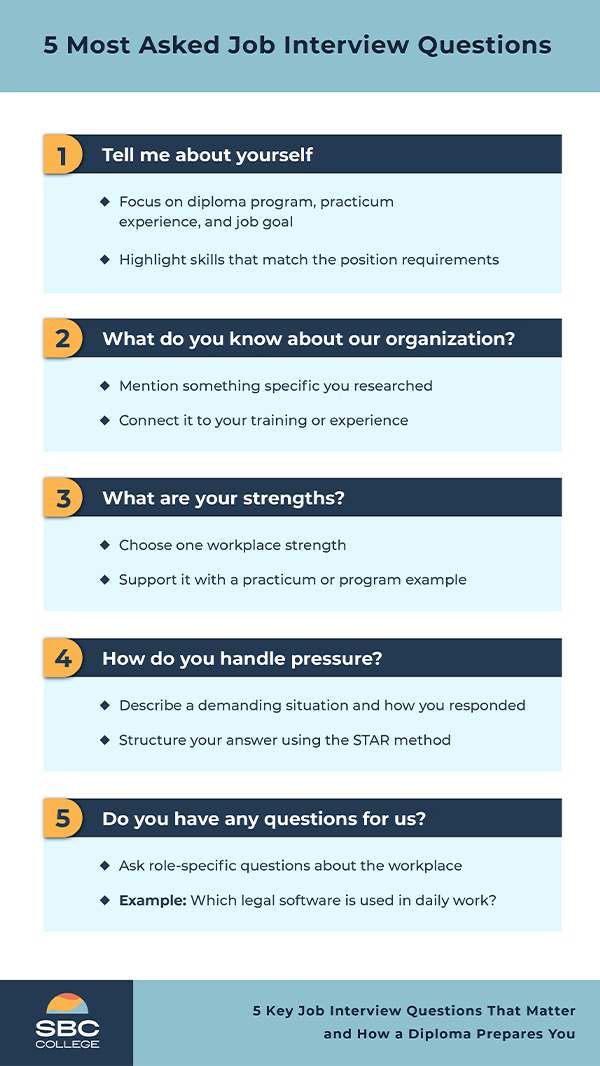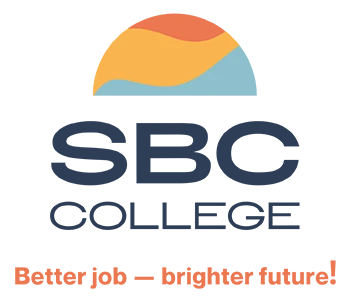Table of Contents
Facing a job interview can feel like entering a whole new world. You’ll be sitting across from an employer who doesn’t know you, and it’s up to you to explain why you’re the best person for the job.
Before getting into the most common interview questions, let’s understand why interview prep matters.
Listen to: 5 Common Job Interview Questions That Matter and How a Diploma Prepares You
Why Interview Prep Matters
Job interview prep helps you approach conversations with ease.
Whether you’re planning to enroll, working through your diploma program, or already graduated, advance prep helps you speak about your experience, strength, and interest in the role effectively.
It also gives you the chance to work on posture, eye contact, and the questions you plan to ask the employer. These small details combine to create a lasting first impression.
5 Most Important Job Interview Questions
A smart way to get ready for interviews is by reviewing the questions that often come up. Here are five examples to get you started:
1. Can you tell me a little about yourself?
This is often the first interview question and sets the tone for what follows. It’s your chance to guide the conversation and give a brief summary of what you bring to the position.
Focus on your education, hands-on experience, and how that prepares you for the role you’re seeking.
Sample Answer: “I recently completed the Medical Office Administration diploma, where I learned about medical office procedures, transcription, and electronic medical records. During my practicum at a busy clinic, I helped with scheduling, patient intake, and handling EMR updates. That experience confirmed how much I enjoy the routine of healthcare settings, so I’m now looking for a position where I can continue supporting both patients and clinical teams.”
A self-introduction like this allows you to lead the conversation and highlights the value you bring to the role.
2. What do you know about our organization?
This question assesses if you’ve researched the company and how your goals align with it. Share a specific detail from your research and explain how it relates to your training or interests.
Sample Answer: “I read that your firm focuses on bookkeeping and payroll services for small and mid-sized businesses. In my Accounting, Tax, and Payroll diploma program, I worked with QuickBooks Online, handled payroll calculations, and learned how to prepare T4s and monthly remittances. I’m interested in applying these skills to support your clients with their everyday financial work.”
Answering this question with insight shows that you’ve done your homework and are already thinking like a part of the team.
3. What are your greatest strengths?
Hiring managers ask this question to understand how you approach your work. During your interview prep, think about the strengths you developed through your diploma program, such as attention to detail, time-management, or organization.
Sample Answer: “During my Executive Assistant practicum, I supported an executive with back-to-back meetings. I noticed calendar conflicts, adjusted the schedule, and added key details to each entry to help them prepare quickly. My supervisor said I was one of the most organized students they’d worked with. That experience showed me how being organized and detail-oriented can make a busy day manageable.”
A good example demonstrates your strengths and reflects how you handle the demands of a workplace.
4. How do you deal with pressure or stressful situations?
Behavioural questions assess how you handle shifting priorities. Use the STAR method (Situation, Task, Action, Result) to share strategies and soft skills you have applied in past situations.
Example:
S (Situation): Returning to school after several years
T (Task): Balancing school, work, and parenting
A (Action): Created a routine that included time to study, and used the supports that were available
R (Result): Completed the program successfully
Sample Answer: “Returning to school after several years was a big adjustment. I had to balance school, work, and parenting responsibilities. It was challenging at first, but I created a routine, reviewed study material daily, and used the support that was available. Over time, I adjusted and successfully completed my program.”
Sharing an experience in a structure like this shows not only what you can do, but what you have done.
5. Do you have any questions for us?
One of the most valuable interview tips is asking good questions at the end of your conversation.
This is your chance to show you’re engaged and thinking beyond the interview itself by asking insightful questions. Take this opportunity to learn more about the team, the role, and the work environment.
You could tailor your questions to the position. For example:
- Legal Assistant: As part of my program, I learned about several types of law, and I see that your firm handles a variety. What types of cases would I support most often?
- Education Assistant: My practicum included working with a variety of staff. How do teachers and support staff in your school coordinate on student progress?
- Network Systems Administrator: In my practicum, I worked on specific security risks. What is the process for handling security risks at your organization?
- Graphic Design Specialist: As part of my practicum, I delivered several projects under time pressure. How are project timelines set to meet client needs?
Having thoughtful questions for employers shows that you’re genuinely interested in the role and leaves a strong final impression.
Preparing for these questions lets you speak with clarity and connect your college experience to the job. Whether it’s a practicum example, a skill you built in class, or a time you handled pressure, each answer gives a picture of how you work and what you bring to the team.

How SBC College Programs Prepare You for Interviews
Interview prep is part of the student experience at SBC College. Alongside your diploma program, you receive support from our Career Services team to help you speak confidently about your skills and practicum during interviews.
This includes resume and cover letter reviews, mock interviews, and personalized job search strategies. Support is available throughout your studies and after graduation.
Tim H., Assistant Education Manager of SBC College Career Services, highlights the value of this individualized support:
“Any one of our graduates, alumni, or students can set up one-on-one sessions with one of our Career Services team members to go over their career goal, so that we can provide the advice specifically that they might need.”
Whether you’re customizing your application or preparing for a behavioural interview, this support helps you walk in ready to connect your training to the job.
To learn more about SBC College diploma programs and career support, contact an admissions advisor today.
Bonus Tips for Acing Your Interview

The best way to stand out in an interview is by approaching each stage with purpose, from how you arrive to how you follow up.
- Dress for the Setting
Choose clean, professional clothing that fits the workplace. - Practice Out Loud
Speaking your responses aloud helps with pacing and makes it easier to organize your thoughts. - Bring a Resume Copy
Even if they have one, bringing your resume shows you’re prepared. - Arrive Early
Be at the location or logged in 5–10 minutes early to settle in before the interview starts. - Send a Thank You Email
Follow up within a day. Mention something specific from the conversation and express your continued enthusiasm for the position.
Each step adds to the impression you make and helps you approach the interview with intent.
Frequently Asked Questions (FAQ)
Can I talk about group projects or practicum in my answers?
Yes. Group projects and practicum are great examples of how you work with others, solve problems, and apply what you’ve learned.
How do I handle questions about limited experience?
Talk about what you’ve learned in your program, like using tools or meeting deadlines, and highlight transferable skills such as adaptability or communication.
How should I answer questions about my strengths and weaknesses?
Pick a strength that fits the job and back it up with an example. When discussing weaknesses, think of an area where you’ve made intentional changes and focus on the steps you took and progress you made.
What are good questions to ask the employer at the end of the interview?
Choose questions that relate to the role. For example, you could ask about the types of cases handled in a legal assistant position, the ways teachers and support staff share progress in an education assistant role, or how client project timelines are set for a graphic design specialist.
How do I explain gaps in my education or work history?
Briefly explain what you focused on during that time, such as continuous learning or personal responsibilities, then shift to what you’re ready to take on now.
What is the best way to follow up after an interview?
Send a thank you email within 24 hours that mentions something specific you discussed and restates your interest in the job.






